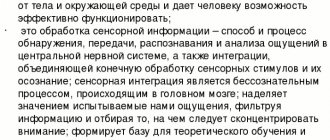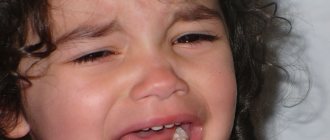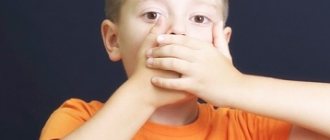Article:
Sensory alalia, or receptive, impressive - underdevelopment of speech due to impaired auditory perception with normal physical hearing.
A child with this pathology does not understand spoken speech, does not distinguish between sounds, and does not have phonemic hearing. He also has other disorders. It is rare in its pure form, but nevertheless requires the intervention of a speech therapist, defectologist and neurologist and timely correction. In the article you will learn the causes of the disease, treatment and prognosis of sensory alalia.
Disturbance of speech centers
The problem of sensory alalia has been studied quite well by specialists, but there is still no consensus on the reasons for its development. Some scientists identify it as an independent disorder of the speech centers of the brain, while others consider it a consequence of more serious diseases. The intermediate option prefers to consider sensory alalia a separate disorder, but with a strong influence of other factors in the child’s development. In particular, alalia is often one of the symptoms of early childhood autism or mental retardation. In this article we will highlight the main causes and symptoms of this pathology, and also talk about methods for diagnosing it.
Causes and risk factors
Damage to the speech centers of the cerebral cortex, causing the development of alalia, occurs during pregnancy or at an early age, i.e. even before speech formation begins. Factors that significantly increase the risk of pathology include:
- problems during pregnancy: hypoxia, toxicosis, infections (especially the TORCH complex), injuries, chronic diseases and bad habits in the mother;
- birth injuries, asphyxia, pathological course of labor (protracted, fleeting);
- premature birth;
- severe illnesses in the first years of life: acute respiratory viral infections, pneumonia, conditions requiring the use of anesthesia;
- traumatic brain injuries;
- unfavorable social situation in the family.
Often, not one, but several pathological factors are involved in the formation of alalia, leading to the development of minimal brain dysfunction (MCD). This is a complex disorder manifested by mental retardation, including impaired speech functions.
Reasons for development
Alalia is a consequence of organic brain damage. More precisely, damage to one of the areas of the brain in which primary sound processing occurs. Since the rest of the brain is not affected by sensory alalia, the child grows up quite healthy, but he has problems with speech perception. He does not develop so-called phonemic hearing: the child cannot distinguish between individual sounds in speech and, as a result, cannot perceive his own and others’ speech. In addition, neighboring areas of the brain also cease to participate in sound processing, which is why the child cannot correlate words with visual images and actions. Simply put, the child hears words well (for example, turns towards the speaker), but does not understand the meaning of what was said. All this happens due to the underdevelopment of certain areas of the brain responsible for analyzing sound information. There are several reasons why some areas of the brain “lag behind” in development, as a result of which alalia develops:
- Severe poisoning of the mother of the child during pregnancy;
- Asphyxia and hypoxia of the fetus during pregnancy;
- Attempts to terminate pregnancy and threat of miscarriage;
- Conflict of Rh factors of mother and fetus;
- Physical and psychological trauma of the mother during pregnancy;
- Smoking and drinking alcohol and drugs during pregnancy;
- Infectious diseases suffered by the child in infancy (meningitis, encephalitis and others);
- Rapid or, conversely, prolonged labor;
- Child's brain injury after birth.
Classification: forms of alalia in children
The development of alalia in a child can be caused by damage to various parts of the cerebral cortex. Depending on the location of the pathological focus, the symptoms of the disease may vary, which allows us to distinguish three main forms:
- motor (expressive): the area responsible for speech production suffers; at the same time, the child understands the words addressed to him, can follow commands, but is not able to pronounce articulate sounds; within this form, afferent and efferent varieties of alalia are also distinguished; in the first case, the child cannot control the functioning of the speech apparatus and pronounces sounds incorrectly; in the second, there is difficulty in switching articulatory acts, i.e. It is difficult for the child to follow the sequence of speech movements.
- sensory (impressive): occurs when the auditory-speech analyzer is damaged, i.e. the child cannot understand speech addressed to him, and, accordingly, cannot speak;
- mixed: signs of both forms are observed; Depending on the predominance of certain symptoms, sensorimotor and motosensory varieties of alalia in children are distinguished.
Signs and symptoms of alalia
To recognize sensory alalia in your child (or at least worry about going to a specialist), special knowledge is not required. Alalia is characterized by another pathology called echolalia. This is the name of a condition in which a person repeats everything that the interlocutor tells him. For example, a child is asked something, and instead of answering, he repeats the question. Obviously, he does not understand the meaning of what was said, so in such cases it is necessary to contact a specialist.
Very often you can catch familiar phrases in meaningless words. Most likely, the child heard them on TV, in songs or in your speech, and now repeats them. Naturally, here too he does not understand anything said, although individually he knows what each word means. Alalia can also be a manifestation of logorrhea. This pathology is presented in the form of a stream of phrases, individual words and even syllables that are confused with each other and do not carry any semantic load. Moreover, the child himself is not aware of this problem, so made-up words appear in his speech, formed by rearranging syllables or mixing several words into one. Sometimes it happens that a child “gets fixated” on one word or phrase, repeating it an infinite number of times.
Prognosis and prevention
The prognosis depends on the severity of the disease, as well as the time of initiation of correction.
If you contact a specialist in a timely manner and regularly and carefully follow all recommendations, the likelihood of successful correction increases. The motor form of alalia is easier to eliminate, but with the sensory and sensorimotor forms the prognosis is not always favorable. Prevention of alalia means following all doctor’s recommendations during pregnancy, regular activities with your baby, and minimizing the risk of injuries and diseases.
Peculiarities
In mild cases of sensory alalia, the child understands individual words of adults and even some phrases well. They understand ambiguous phrases only in one context, but express their own thoughts quite clearly. But if adults suddenly decide to complicate a phrase, or change the order of words in it, children begin to have problems. More severe forms of alalia cause serious trouble for children and their parents. Any words do not cause any response in the child, since the brain does not perceive them as irritants. This means that the child does not understand adults at all, and is also in no hurry to say anything in response. In some cases, children begin to understand the meaning of what was said only after they pronounce this phrase on their own.
Approximately 70% of children diagnosed with alalia do not have any hearing problems, and in the remaining 30% this pathology is associated with impaired development of the hearing organs. Oddly enough, the second case is easier to treat, since after the return of normal hearing the child quickly catches up with his peers in development. It is much more difficult to help children whose hearing is normal. At different periods of time, a child may or may not hear sounds of the same volume and frequency, as this depends on the state of his brain. It is difficult to carry out developmental activities with him, since the child quickly gets tired of sound stimuli and does not respond to the instructions of the doctor or teacher.
Another symptom of sensory alalia is hyperacusis - that is, increased sensitivity to other sounds not related to speech. Even healthy adults can find it unpleasant to hear, for example, the movement of a glass cutter on glass, and children with alalia experience even more such irritants. At an early age, when a child often cries and screams, this can simply be attributed to discomfort caused by loud music or other irritants. But if a fairly large child begins to cry at certain sounds, cover his ears, panic and run away from the room, he needs to be taken to a specialist for examination.
With sensory alalia, the child’s memory functions suffer. This is expressed in the fact that he cannot correlate the spoken word with an object (remember its image or, conversely, name the object when he sees it). Phonemic perception is impaired; a child needs to repeat a word more than 20 times to understand and remember it. If words that are similar in sound but different in meaning (homonyms) are used, then the child will not be able to understand what exactly is being said.
The voice of children suffering from alalia is sonorous, but it seems “dead” to others. The speech of such a child is mechanical in nature; it is distinguished by numerous errors in stress, rearrangement of words in phrases and replacement of individual syllables. Children's attention is scattered, it is difficult for them to concentrate on completing any task, and they behave restlessly and fussily. At the same time, children respond well to changes in intonation and volume of voices, and they themselves actively use gestures when communicating with peers and adults. Moreover, with mild forms of sensory alalia, children can speak quite smoothly and freely, but they experience problems with selecting the right words, placing stress and choosing intonation. Against the backdrop of misunderstanding on the part of others, and especially other children, they develop mental disorders and delays in intellectual development.
Complications of sensory alalia
Impaired sound perception leads to incorrect pronunciation and unformed expressive speech. An additional symptom of sensory alalia is general speech underdevelopment. It is difficult for such children to master school material due to disorders of learning skills - impaired writing and reading. They find it difficult to communicate with peers.
In later life, this causes signs of psychological disorders and emotional and volitional disorders. The intellect suffers and mental retardation develops. Children become unsociable, withdrawn, and live in their own little world.
How is it diagnosed?
Diagnosis of alalia includes observation by several specialists and doctors at once. An ENT specialist is necessary in order to “cut off” potential causes in the form of improper development of the auditory organs. Then a neurologist comes to work, who, using tomography, X-ray diagnostics and other studies, determines the presence and extent of damage to individual areas of the brain. Only after these specialists, a speech therapist examines the child for the presence of sensory alalia, offering the child simple tasks related to understanding information (asking to take a certain object, name the animal in the picture, etc.).
Treatment
Treatment is carried out in several directions.
Speech therapy exercises. Can be carried out individually or within a special school. Positive results are achieved only by systematic, long-term training.
Under the guidance of a speech therapist, the child gradually masters the pronunciation of individual syllables and words and recognizes speech by its sound. With the help of various pictures, the skills of linking them with specific words are acquired.
When certain progress has been made, the child is already able to name one or another object shown in the picture. Gradually, the baby masters the correct endings of words, cases and declensions.
Additionally, classes are conducted that develop fine motor skills using drawing, modeling, cutting, and construction toys.
The success of treatment largely depends on home exercises. Exercises conducted with a speech therapist should be constantly reinforced with the direct participation of parents.
Speech therapy massage. Considered an effective addition to exercise. It develops individual muscles of the oral cavity responsible for correct pronunciation. The procedure is performed manually or using a special probe. Additionally, speech muscles are developed with the help of specific exercises designed specifically for these purposes.
Physiotherapeutic procedures. They are prescribed in the form of specific courses, depending on the child’s condition. They can be supplemented with hydrotherapy, magnetotherapy, laser therapy and other procedures.
Reflexology. Its essence is to stimulate the necessary areas of the brain with electrical impulses. This leads to the formation of new neural connections that facilitate learning. Applies to children over 9 years of age.
Drug therapy. Includes the use of drugs that stimulate blood flow to the brain. Additionally, vitamins B12 and B15 are prescribed. Much attention is paid to a balanced diet.
The need for examination for alalia
The goal of all these studies is to exclude hearing loss (it is treated by an ENT specialist) and autism with mental retardation from potential diagnoses. Sensory alalia is not a sign of mental retardation in a child, since such children have normal intelligence. If a specialist nevertheless makes this diagnosis, it is necessary to carefully monitor the child, since alalia manifests itself differently in different situations. It is corrected quite successfully, however, due to the restlessness of children and poor perception of information, this process can take a long time. Here everything depends on the experience of the specialist and the perseverance of the parents, since they are tasked with the daily work of developing their child.
At the slightest sign, we recommend immediately seeking advice from specialists. The faster you identify a violation, the higher the likelihood that the consequences will be minimal and timely correction will help the child. Don’t put off until tomorrow the most important thing – your baby’s health. By doing this you will help both yourself and him to avoid serious problems in the future. In Russia, the diagnostic system is quite well developed. You can contact private specialists or refer kindergartens and schools for free examination to government institutions.
Alalia correction is carried out at the Govorush center.
For more detailed information, you can contact our specialists by phone, +7 (921) 744-18-52, or contact the address: St. Petersburg, Pulkovskaya str., building 2, building 1. st. Zvezdnaya metro station from 9.00 to 20.00. We are always happy to help you.
Diagnostics
Any form of speech impairment, regardless of the severity and severity of the symptoms, requires a comprehensive examination with the participation of a neurologist, psychologist, speech therapist, otolaryngologist and other specialists. A neurological examination is aimed at searching for a pathological focus in the cerebral cortex, as well as excluding other causes of speech impairment. The study usually includes:
- electroencephalography (EEG);
- Ultrasound of the brain (echoencephalography);
- MRI of the brain;
- X-ray of the sella turcica.
The ENT examines the hearing organ: otoscopy, audiometry and other tests aimed at identifying hearing loss, and also evaluates the condition of the oral cavity and larynx. It is mandatory to evaluate auditory-verbal memory, diagnose the structure of speech, etc. During consultations, it is necessary to tell doctors in detail about the progress of pregnancy and childbirth, injuries and illnesses suffered, as well as all the features of the physical and mental development of the baby.
Home therapy for alalia
In addition to classes with specialized specialists, you can conduct additional classes at home. To get rid of the disease, the parent must focus as much as possible on his baby and help him. There are some effective methods designed specifically for patients:
- The baby must learn to understand speech by ear. The parent names the object, the child must show it. If he showed it wrong, you need to show it correctly. This exercise is repeated many times for alaliks before he understands what is required of him. Bright toys and colored figurines are suitable for such activities.
- If the vocabulary is wide, train him to pronounce the names of objects by showing them.
- You need to talk to children suffering from alalia more often. Parents' speech should be clear, correct and not too fast. With sensory alalia, words must be accompanied by a demonstration of corresponding pictures.
- Show the letters. And then say words starting with these letters. Ask your child to show the letter with which the word begins and pronounce the whole word.
Take your child a few books with bright illustrations and get him interested in reading. Tell interesting stories and show what the main characters look like. Educational games with adults can help.







